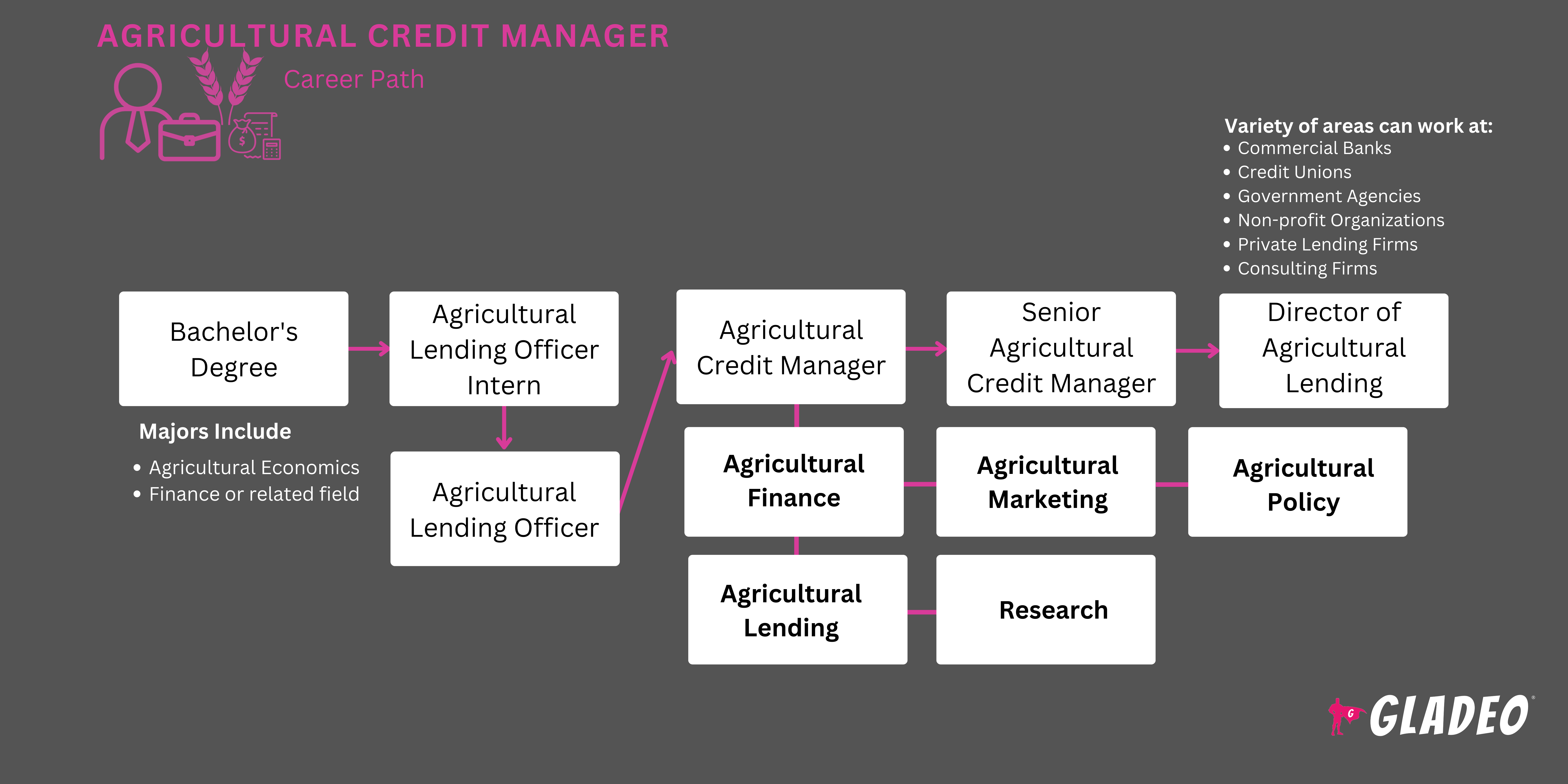스포트라이트
Agricultural Lending Manager, Farm Credit Analyst, Agricultural Finance Officer, Rural Credit Portfolio Manager, Agricultural Loan Underwriter, Agribusiness Credit Specialist, Farm Loan Administrator, Agricultural Risk Assessment Manager, Agri-Finance Relationship Manager, Crop and Livestock Loan Officer
Agriculture is big business. Huge, in fact, with ~$1.26 trillion contributed to America’s gross domestic product in 2021! The sector is so large there that many financial lenders specialize in only agricultural lending. Such organizations employ Agricultural Credit Managers to oversee ag loans and other types of ag financing.
Part of an Agricultural Credit Manager’s job is to assess loan applications, which involves determining the financial health and creditworthiness of potential borrowers, as well as suitable loan amounts and interest rates. These managers work with borrowers to explain loan terms and offer advice aimed at reducing risks and achieving positive outcomes for all parties. In addition, Agricultural Credit Managers often help develop relevant ag-related credit policies based on laws, regulations, and industry trends.
- Empowering agricultural business owners with the funding they need to grow
- Being part of a massive sector that is vital to the economy and the food supply chain
- 수익성이 높고 전문화된 틈새 시장에서 일하며 훌륭한 커리어 기회 제공
- 농촌 지역사회의 재정 건전성과 안정성에 미치는 영향
근무 일정
- Agricultural Credit Managers work full-time jobs, typically during normal bank hours, with nights, weekends, and holidays off. Occasional travel may be necessary.
일반적인 의무
- Schedule appointments to meet with loan or credit applicants and other potential borrowers, including farmers, local agribusinesses, or rural community businesses in the ag sector
- Review applications and verify reported income, assets, property values, tax payments, and debts of potential borrowers as part of the underwriting process
- Complete financial spreading tasks to transfer applicant financial data into analysis software
- Consider specific risks outside of the borrower’s control, such as market conditions, crop yields, livestock prices, etc.
- Collaborate with analysts and property appraisers, as needed
- Determine whether or not applications should be approved, what collateral needs to be put up (if any), the loan or credit amounts to be offered, suitable interest rates, and applicable repayment terms
- Complete applications and carefully review risks and terms with borrowers
- Keep clients updated on any information relevant to their accounts/portfolios
- Meet with institutional leadership to discuss issues, priorities, and goals
추가 책임
- Conduct periodic, scheduled reviews of existing accounts
- Complete training and development sessions, or organize them for other team members, as needed
- Help write, review, or revise credit administration policies to align with updated laws, regulations, and guidelines, in order to improve efficiency and compliance
- 지역 농부, 농기업 소유주, 산업 협회, 관련 단체 또는 기관과 좋은 관계를 유지합니다.
소프트 스킬
- 분석
- 의사소통 기술
- 고객 서비스
- 결정적인
- 디테일 지향
- 독립의
- 무결성
- 목표
- 조직
- 환자
- 문제 해결
기술 능력
- Financial modeling and analysis skills
- Credit evaluation and loan management software
- 농업 분야에 대한 지식
- Agricultural markets
- 작물 생산
- Farming economics
- Livestock prices
- Risk assessment and management principles
- 스프레드시트
- 고객 관계 관리 소프트웨어
- Banks, credit unions, and other lending institutions
Agricultural businesses are vital to the economy at all levels but have particular impacts on rural communities. When an ag business fails for any reason, the loss can be devastating to the local economy. But private lending institutions can’t afford to take big risks when it comes to offering loans or extending credit.
Agricultural Credit Managers must be very objective when assessing the creditworthiness of a business. They can’t rely on wishful thinking. They must also consider the effects of external factors that may help or hurt the borrower’s business. Sometimes credit managers have to make tough and even unpopular choices, without seeming to come across as unfair or unempathetic.
The agricultural sector has been hit hard by various climate and environmental factors, which can increase costs, decrease crop production, and lead to financial losses. Agribusinesses must do their best to adapt, which can involve making “climate-smart” practices or trying more resilient crop varieties. In addition, many farmers are shifting to more sustainable and environmentally-friendly practices, though there can be added costs to such moves.
The FDIC lists five “perennial health hazards” to the sector, including environmental risks, market volatility, rising interest rates, geopolitical risks, and a general decline in farmland values. It goes on to note that “Robust credit concentration risk management begins at the bank level, includes sound agricultural lending practices, and considers any associated third-party risks.” In other words, Agricultural Credit Managers have to understand and follow established practices to help mitigate the above risks as best as possible.
- Agricultural Credit Managers often have a bachelor’s or master’s degree in finance, accounting, or business
- Most applicants won’t start in a managerial role. Employers usually want candidates with relevant experience in agriculture-related credit management or collections
- Some employers hire from within, promoting current employees into management positions
- Students should also have a strong understanding of the agriculture sector and the variables which impact its financials. This can be gained through college classes, such as a minor in agricultural business
- Businesses typically provide some On-the-Job training for new credit managers and may send them to courses to hone their skills
- Completing a Certified Management Accountant or Certified Public Accountant credential can enhance one’s qualifications and professional credibility
- Students should seek colleges offering majors in accounting, finance, or business
- Consider schools that also feature courses in agricultural business
- 특히 농업 신용 관리와 관련된 실무 경험을 쌓을 수 있는 인턴십이나 기타 기회가 있는 프로그램을 찾아보세요.
- 항상 수업료와 기타 비용을 비교합니다. 장학금 및 재정 지원 옵션을 검토하세요.
- 졸업생을 채용하는 회사와 파트너십을 맺은 프로그램이 있는지 확인하세요!
- 졸업생에 대한 졸업 및 취업 통계 기록하기
- High school students should take courses in business, accounting, finance, math, English, communications, information technology, statistics, and speech or debate
- Knowledge of agriculture and agricultural business practices will be very useful
- Having banking and credit management experience can be helpful. Look for part-time jobs where you can rack up some relevant work experience
- 학교를 통해 또는 직접 관련 인턴십에 지원하세요.
- Read magazines and website articles related to agribusiness and specialized lending
- 농업 비즈니스에 대해 자세히 알아보려면 코세라 또는 기타 사이트를 통해 임시 강좌를 수강하는 것이 좋습니다.
- Request an informational interview with a working Agricultural Credit Manager at a local bank or other lending institution
- Students may also want to brush up on government laws and loan options related to farmers and agribusiness owners, such as Farm Ownership Loans, Farm Operating Loans, Marketing Assistance Loans, the Inflation Reduction Act Assistance for Distressed Borrowers, etc.

- 인디드닷컴, 링크드인, 글래스도어, 몬스터, 커리어빌더, 심플리히어드, 집리크루터와 같은 채용 포털을 확인하세요.
- 관리자급에서 시작하기를 기대하지 마세요! 이미 몇 년의 관련 경력이 있는 경우가 아니라면, 먼저 초급 직급에 지원해야 합니다.
- Consider relocating close to a rural area where there are farm banks and agribusinesses
- Note, the FDIC states there are 1,500 farm banks, “heavily concentrated in the nation's heartland, including the Corn Belt and Great Plains”
- Stay in touch with classmates and use your network to get job tips. Most jobs are still found through personal connections, and the world of agricultural lending isn’t that big!
- 교수자, 이전 상사 및/또는 동료에게 개인 추천을 해줄 의향이 있는지 물어봅니다. 사전 허가 없이 그들의 개인 연락처 정보를 제공하지 마세요.
- Check out some Agricultural Credit Manager resume examples and sample interview questions
- 학교 커리어 센터(있는 경우)와 함께 모의 면접 연습하기
- 면접에 적합한 복장을 갖추고 해당 분야에 대한 열정과 지식을 보여주세요.
- Work objectively while ensuring clients feel taken care of. Explain negative loan or credit decisions in a way that is empathic and does not burn bridges
- Resolve client issues quickly and try to ensure the best outcomes for everyone. Lenders rely on repeat business from clients, and it’s more cost-effective to keep existing clients than to find new ones
- Keep track of trends and challenges within the agribusiness industry (in particular, all factors that affect production and profits)
- Be proficient in software programs for financial modeling, risk assessment, credit evaluation and loan management, and customer relationship management
- 팀원들과 효과적으로 협업하고 지역 농부, 농기업 소유주 및 기타 지역 사회의 이해관계자들과 긴밀한 관계를 구축하세요.
- Communicate regularly with leadership and stakeholders to ensure objectives and problems are clearly defined
- 상사에게 경력 개발에 관심이 있음을 알리고 조언을 구하세요.
- Earning a graduate degree may help some Agricultural Credit Managers qualify for advancement
- For those working at small institutions, you may have to apply to work for a larger organization to make a bigger paycheck or reach larger career goals
- Completing a Certified Management Accountant or Certified Public Accountant credential should enhance your qualifications. Advanced certifications such as the Credit Executive Leadership Institute’s Certified Credit Executive can boost your credentials even more!
웹사이트
- AgFirst Farm Credit Bank
- AgriBank, FCB
- AgVantis Inc.
- 미국 은행가 협회
- American Institute of Certified Public Accountants
- 금융 전문가 협회
- CFA 연구소
- CoBank, ACB
- Farm Credit
- Farm Credit Administration
- Farm Credit Bank of Texas
- Farm Credit Financial Partners Inc.
- Farm Credit Foundations
- Farm Credit System Insurance Corporation
- SunStream Business Services
책
- Eating Tomorrow: Agribusiness, Family Farmers, and the Battle for the Future of Food, by Timothy A. Wise
- Fundamentals of Agribusiness Finance, by Ralph Battles and Robert Thompson
- Principles of Agricultural Economics, by Andrew Barkley and Paul Barkley
Compared to some career fields, Agricultural Credit Management isn’t a huge field and most jobs will require living near rural areas—which may not be everyone’s cup of tea! If you’re curious about related career options, consider the below similar occupations:
- 회계사 및 감사
- 예산 분석가
- 재무 분석가
- 보험 판매 대리점
- 보험 보험업자
- 대출 담당자
- 개인 재무 설계사
뉴스 피드

주요 채용 정보

온라인 과정 및 도구








